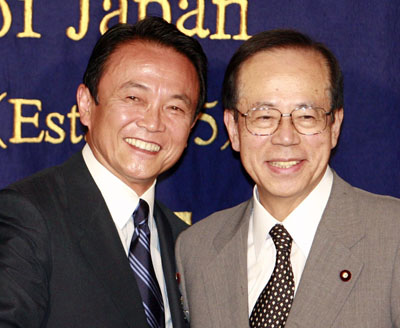|
|

|
|
RISE AND FALL: Japanese Prime Minister Yasuo Fukuda (right) shakes hands with former Foreign Minister Taro Aso at a meeting in Tokyo in September 2007 |
Then in late August, a political scandal emerged involving Agriculture, Forestry and Fisheries Minister Seiichi Ota. A political group supporting Ota, who was appointed in a cabinet reshuffle on August 1, reported more than 23 million yen ($215,000) in office costs for 2005 and 2006, even though Ota's Tokyo office was in his policy research secretary's home. The scandal was a heavy blow to the Fukuda administration, Jin said. It not only damaged the government's image among the Japanese people, but also became a political weapon for the opposition.
Parliamentary deadlock was another problem for the Fukuda administration, said Liu Jiangyong, a Japanese studies professor at Tsinghua University. In an article published in People's Daily, he said that the Abe administration left a big "burden of history." In the 2007 election, the LDP lost its majority in the upper house for the first time since its founding in 1955. Control over the House of Councillors passed to the opposing Democratic Party (DP), while the lower house is still run by the LDP and the New Komeito Party in a coalition government.
Fukuda therefore had his hands tied by political stalemate. Under the Japanese Constitution, the government must submit all draft laws, resolutions and budget plans for parliamentary approval, Liu explained. With the opposition controlling the upper house, Fukuda government proposals were easily delayed or denied. Earlier this year, the DP vetoed Fukuda's first two nominees to run the central bank.
In June, the House of Councillors passed a non-binding censure motion against Fukuda, formally reprimanding a sitting prime minister for the first time under Japan's post-war constitution. Although Fukuda reshuffled his cabinet on August 1, the situation did not improve.
Jin gave another possible reason for Fukuda's resignation, noting Japan's upcoming general election. Before his resignation, Fukuda announced an extraordinary Diet session to be held later this month to address outstanding items from the last legislative meeting. As the weakened prime minister had little chance of passing his economic stimulus package and other measures during the meeting, the LDP would be tarnished in the general election. Fukuda had two choices: dissolve the lower house and hold an early election the LDP might lose, or resign. "Considering the LDP's interest, Fukuda chose to resign," Jin concluded.
Who's next?
According to the latest reports, seven candidates are expected to contest the LDP leadership election on September 22. The star candidates include former Japanese Foreign Minister Taro Aso, former Defense Minister Yuriko Koike, former Defense Minister Shigeru Ishiba and Economic Minister Kaoru Yosano.
Aso, 67, is widely considered the favorite. As LDP Secretary General, he is in the position closest to LDP president. He has an outstanding resume and incomparable political resources. In addition to his term as LDP Secretary General, he was Foreign Minister under Abe and Junichiro Koizumi and has served in the House of Representatives since 1979. He is the fourth generation of a political family that includes former Prime Ministers Yoshida Shigeru and Zenko Suzuki.
Meanwhile, the 56-year-old Koike faces an uphill battle in her campaign to become Japan's first female prime minister.
In candidate statements published in the Daily Yomiuri on September 8, Taro promised to reduce income tax and boost government spending to revive the economy, while other candidates called for higher tax rates and economic reform.
Whoever the new prime minister is, the winner is not playing a funny political game, said Liu from Tsinghua University. In the face of strong political opposition, the new prime minister must make enough economic headway to maintain public support.
Liu Junhong, a researcher at the Institute of Japanese Studies, China Institutes of Contemporary International Relations (CICIR), published an article in Outlook Weekly explaining the current political and economic situation in Japan.
In recent decades, Japanese politics has become unstable. The fight between the LDP and the DP, which was formed when several smaller parties merged in 1998, prevents the two-party system from properly maturing. It is no surprise that prime ministers tend to resign frequently and suddenly, as neither party is able to gain majorities in both houses and the opposition party in each house constantly seeks to undermine the ruling one. Meanwhile, the only way smaller parties can exert influence is to form ruling coalitions with the LDP and the DP. "These smaller parties now embrace utilitarianism rather than loyalty to a certain ally, which increases instability in ruling coalitions," Liu from the CICIR concluded.
Japan has all the problems of a developed economy, Liu said, including slower economic growth and a decreased ability to compete internationally. At the same time, a sliding birth rate, aging population and widening income gap have strained social programs. "To solve all these political and economic problems, the new prime minister needs to reform Japan's party system and economic structure," Liu said. | 